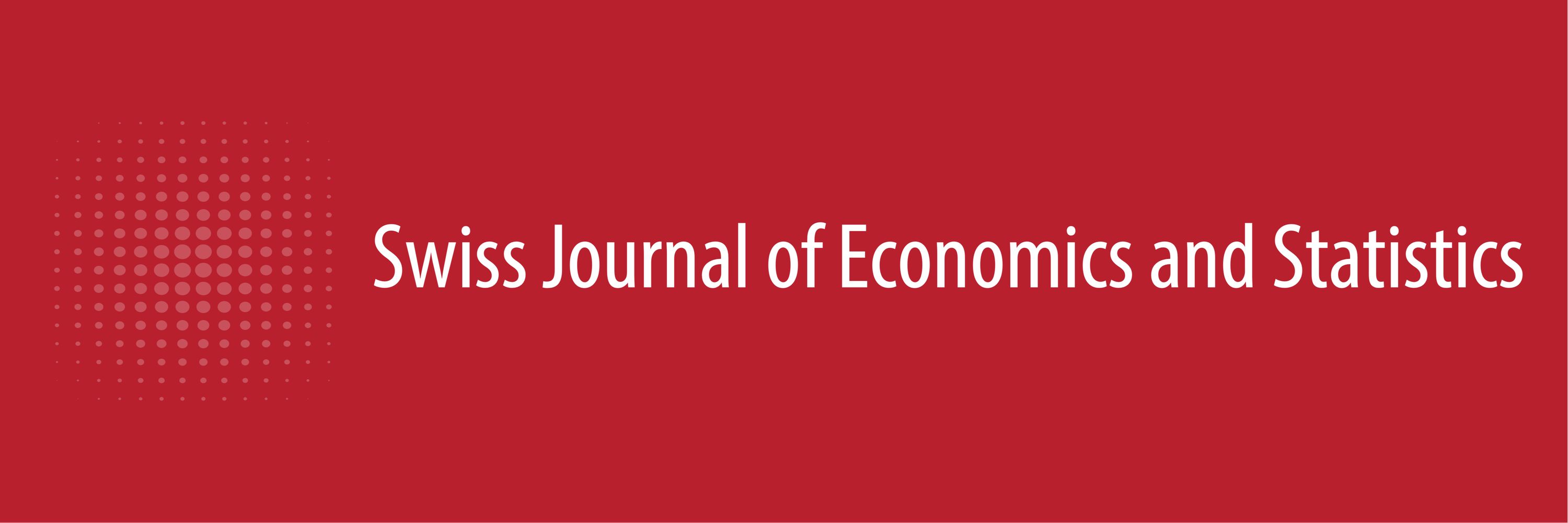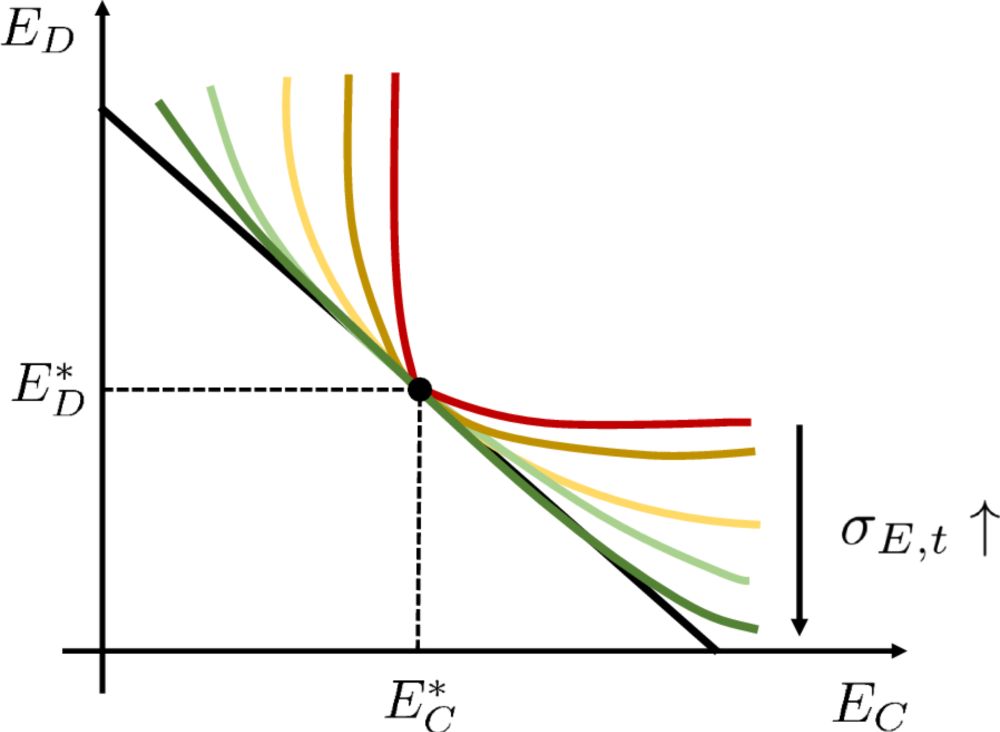
Swiss Journal of Economics and Statistics
@sjeseditors.bsky.social
News from the editors of the Swiss Journal of Economics and Statistics http://sjes.springeropen.com
However, the redistribution of tax revenues benefits rich households relatively more than poor households.
Want to learn more? Read the article open access on sjes.springeropen.com/articles/10....
Want to learn more? Read the article open access on sjes.springeropen.com/articles/10....

Equity and efficiency of carbon tax policies in Switzerland with endogenous energy substitution - Swiss Journal of Economics and Statistics
The costs and speed of the energy transition are closely linked to the elasticity of substitution between fossil fuels and clean energy sources. Yet, despite its central role, this parameter has been ...
sjes.springeropen.com
October 31, 2025 at 10:12 AM
However, the redistribution of tax revenues benefits rich households relatively more than poor households.
Want to learn more? Read the article open access on sjes.springeropen.com/articles/10....
Want to learn more? Read the article open access on sjes.springeropen.com/articles/10....
While other studies treated this parameter as exogenous, he assumes that it depends on the relative share of clean energy in the economy. A higher carbon tax increases the elasticity of substitution, reducing the overall economic cost of climate change mitigation.
October 31, 2025 at 10:12 AM
While other studies treated this parameter as exogenous, he assumes that it depends on the relative share of clean energy in the economy. A higher carbon tax increases the elasticity of substitution, reducing the overall economic cost of climate change mitigation.
These insights are relevant for policy makers and practitioners in the public employment service who seek to support jobseekers in navigating modern labour markets with rapidly changing skill requirements.
Want to learn more? Read the article open access on sjes.springeropen.com/articles/10....
Want to learn more? Read the article open access on sjes.springeropen.com/articles/10....

Jobseekers’ skills and job search behaviour - Swiss Journal of Economics and Statistics
This paper uses novel linked survey and administrative data for jobseekers in Switzerland to study jobseekers’ skills, potential skill gaps, and their job search behaviour. Based on a realized sample ...
sjes.springeropen.com
October 21, 2025 at 1:58 PM
These insights are relevant for policy makers and practitioners in the public employment service who seek to support jobseekers in navigating modern labour markets with rapidly changing skill requirements.
Want to learn more? Read the article open access on sjes.springeropen.com/articles/10....
Want to learn more? Read the article open access on sjes.springeropen.com/articles/10....
They also document that the willingness of jobseekers to deviate from their last job in terms of skill requirements is relatively low and that they are reluctant to accept lower wages. However, jobseekers with potential skill gaps do tailor their search strategy to their skill profile.
October 21, 2025 at 1:58 PM
They also document that the willingness of jobseekers to deviate from their last job in terms of skill requirements is relatively low and that they are reluctant to accept lower wages. However, jobseekers with potential skill gaps do tailor their search strategy to their skill profile.
They find that women and older jobseekers are most at risk of lacking digital skills, while low education and little work experience are associated with lacking professional and interdisciplinary skills.
October 21, 2025 at 1:58 PM
They find that women and older jobseekers are most at risk of lacking digital skills, while low education and little work experience are associated with lacking professional and interdisciplinary skills.
She uses textual analysis to extract regional economic sentiments from 15 large Swiss newspapers, with a focus on differences in German and French articles. She finds that regional indicators are useful to forecast regional economic fluctuations.
October 1, 2025 at 2:51 PM
She uses textual analysis to extract regional economic sentiments from 15 large Swiss newspapers, with a focus on differences in German and French articles. She finds that regional indicators are useful to forecast regional economic fluctuations.
The annual loss in domestic grocery sales due to cross-border shopping amounts to 1.5 billion Swiss francs, equivalent to 3.8% of the total market. Larger and lower-income households exhibit a particularly strong propensity to shop abroad.
September 15, 2025 at 6:46 AM
The annual loss in domestic grocery sales due to cross-border shopping amounts to 1.5 billion Swiss francs, equivalent to 3.8% of the total market. Larger and lower-income households exhibit a particularly strong propensity to shop abroad.
The study shows that cross-border shopping expands product variety and lowers prices for consumers in high-price countries, but it diminishes domestic tax revenues, reduces sales, and shifts demand away from local retailers.
September 15, 2025 at 6:46 AM
The study shows that cross-border shopping expands product variety and lowers prices for consumers in high-price countries, but it diminishes domestic tax revenues, reduces sales, and shifts demand away from local retailers.
To identify the causal effect of Switzerland’s COVID-19 border closure on domestic grocery expenditures, the author compares Swiss households living near the national border to Swiss households further inland, using a difference-in-differences framework.
September 15, 2025 at 6:45 AM
To identify the causal effect of Switzerland’s COVID-19 border closure on domestic grocery expenditures, the author compares Swiss households living near the national border to Swiss households further inland, using a difference-in-differences framework.
The study uses detailed grocery transaction data from a large retailer combined with administrative data.
September 15, 2025 at 6:45 AM
The study uses detailed grocery transaction data from a large retailer combined with administrative data.
Therefore, climate policies aimed at reducing emissions from these goods (particularly the luxury versions of those goods) can help ensure that high-income households participate in the emissions reduction effort to an appropriate degree.
September 11, 2025 at 7:26 AM
Therefore, climate policies aimed at reducing emissions from these goods (particularly the luxury versions of those goods) can help ensure that high-income households participate in the emissions reduction effort to an appropriate degree.
Furthermore, it finds that for certain consumption categories, such as transportation (especially aviation), clothing, leisure activities, and eating out, high-income households account for a larger share of total national consumption compared to other categories.
September 11, 2025 at 7:26 AM
Furthermore, it finds that for certain consumption categories, such as transportation (especially aviation), clothing, leisure activities, and eating out, high-income households account for a larger share of total national consumption compared to other categories.
The paper shows that climate policy can be maintained distributionally equitable if the revenues generated from emissions pricing are recycled to households. Low-income households are vulnerable to user-pays policies. Implementing per-capita lump-sum recycling can make the policy more progressive.
September 11, 2025 at 7:26 AM
The paper shows that climate policy can be maintained distributionally equitable if the revenues generated from emissions pricing are recycled to households. Low-income households are vulnerable to user-pays policies. Implementing per-capita lump-sum recycling can make the policy more progressive.
The study uses data from the Swiss Household Budget Survey, which provides information on household income and spending for different consumption goods. The author exploits a database providing estimates of global warming potential per unit of consumption for all consumption goods and categories.
September 11, 2025 at 7:23 AM
The study uses data from the Swiss Household Budget Survey, which provides information on household income and spending for different consumption goods. The author exploits a database providing estimates of global warming potential per unit of consumption for all consumption goods and categories.
At the Swiss Journal of Economics and Statistics we aim to provide quick feedback and an efficient review process (submission to first decision 7 days; submission to acceptance 278 days). In addition, your article will be published open-access free of charge.
August 21, 2025 at 7:07 AM
At the Swiss Journal of Economics and Statistics we aim to provide quick feedback and an efficient review process (submission to first decision 7 days; submission to acceptance 278 days). In addition, your article will be published open-access free of charge.
Possible areas include, but are not limited to, monetary economics, forecasting, climate finance, household finance, political economy, law and economics, economics of regulation, economics of innovation, public economics, media economics, health economics, economics of contracts, and education.
August 21, 2025 at 7:06 AM
Possible areas include, but are not limited to, monetary economics, forecasting, climate finance, household finance, political economy, law and economics, economics of regulation, economics of innovation, public economics, media economics, health economics, economics of contracts, and education.
We welcome original research using textual analysis in all fields of economics and finance.
August 21, 2025 at 7:06 AM
We welcome original research using textual analysis in all fields of economics and finance.
They find that pre-reform fraud amounts to around 4% of the trade volume of treated products, or 0.1–0.2% of overall VAT revenues in reform countries in the preceding year. They show that fraud is concentrated in countries with higher corruption, lower customs efficiency, and lower GDP per capita.
August 5, 2025 at 6:28 AM
They find that pre-reform fraud amounts to around 4% of the trade volume of treated products, or 0.1–0.2% of overall VAT revenues in reform countries in the preceding year. They show that fraud is concentrated in countries with higher corruption, lower customs efficiency, and lower GDP per capita.

